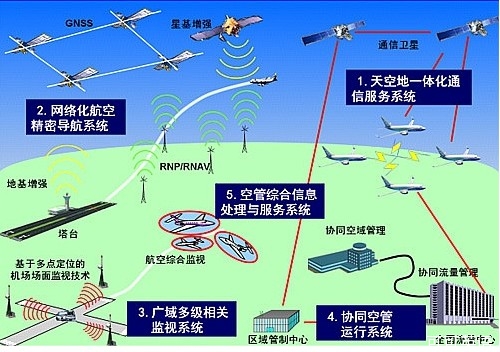
Business Aviation Flight to the future
商業(yè) 航空 飛向未來(lái)
Modernising creaking air-traffic systems will be a huge task
空中交通系統(tǒng)現(xiàn)代化進(jìn)程任重道遠(yuǎn)
THESE days a $15,000 car comes with GPS satellite navigation fitted as standard.
如今一輛價(jià)值15,000美元的車子配備GPS衛(wèi)星導(dǎo)航系統(tǒng)已經(jīng)是司空見慣。
But a $150m airliner still has to be guided through the skies by spoken instructions from a bloke with a radio in a control tower.
但是一架1.5億美元的飛機(jī)卻仍然要通過接受控制塔的無(wú)線電設(shè)備的語(yǔ)音指令航行。
That is because air-traffic management (ATM) systems are stuck in the 1950s.
其原因在于現(xiàn)行的空中交通管理系統(tǒng)(ATM)還停滯在20世紀(jì)50年代。
Instead of flying straight, planes must zigzag from one ground beacon to the next, and ascend and descend in steps, at each stage obtaining permission from the ground.
從一個(gè)地面信標(biāo)到另一個(gè), 飛機(jī)必須蜿蜒飛行而不是直線飛行,一會(huì)升一會(huì)降,而這每一個(gè)步驟飛機(jī)都需要從地面取得許可。
The controllers' radar only shows planes' approximate positions, so they must space them well apart.
并且,因?yàn)槔走_(dá)只顯示飛機(jī)的大概位置,所以控制員必須從很遠(yuǎn)的地方來(lái)定位。
All this wastes fuel and causes congestion and delays.
所有這些都導(dǎo)致了燃油的浪費(fèi),還會(huì)造成交通擁堵和延誤。
The average flight in European airspace is 50km (31 miles) longer than it need be.
在歐洲,飛機(jī)運(yùn)行的距離平均都要比實(shí)際所需距離長(zhǎng)50公里(31英里)。
So the world's aviation authorities are seeking to modernise the whole system, streamlining the routing of flights and providing much more real-time information to pilots and controllers.
因此,全世界的航空當(dāng)局正致力于革新整個(gè)航空系統(tǒng),使航行路線更為順暢,提供飛行員和管制員更加及時(shí)的信息。
This could lead to huge orders for electronics firms, which is why, in his recent jobs speech, President Barack Obama called for $1 billion of extra cash to speed up America's ATM-modernisation project, NextGen.
電子工業(yè)也會(huì)緊跟著收到巨額訂單,這就是為什么奧巴馬總統(tǒng)在最近的就業(yè)報(bào)告中提出要用額外的10億美元來(lái)加速發(fā)展美國(guó)的航空交通管理系統(tǒng)現(xiàn)代化項(xiàng)目 - 下一代(NexGen)。
A study by consultants from McKinsey of Europe's equivalent project, SESAR, finds that its costs should be dwarfed by the fuel savings and the economic boost from squeezing more flights into Europe's busy skies.
麥肯錫公司的咨詢顧問通過研究歐洲相類似的一個(gè)項(xiàng)目(SESAR)發(fā)現(xiàn)系統(tǒng)現(xiàn)代化以后節(jié)省的燃油費(fèi)用,以及更多航班加入帶來(lái)的經(jīng)濟(jì)效益要遠(yuǎn)遠(yuǎn)超過項(xiàng)目的投入。
America stands to make similar gains.
這項(xiàng)發(fā)現(xiàn)也適用于美國(guó)。
It is in everyone's interest to invest in modernisation, but the airlines are wary:
投資現(xiàn)代化總是回報(bào)頗豐,但是航空業(yè)卻并非如此:
several times in recent history they have bought expensive kit only to find they cannot use it because controllers have failed to upgrade their equipment to match.
在近代歷史上,人們好幾次購(gòu)買了非常昂貴的設(shè)配,卻發(fā)現(xiàn)這些設(shè)配根本沒用,因?yàn)榭刂圃O(shè)配沒有升級(jí),所以不能與之配套。
These sorts of ambitious projects to introduce new technology, with countless participants, are prone to cock-ups.
這些雄心勃勃的項(xiàng)目引進(jìn)新的技術(shù),還有不計(jì)其數(shù)的參與者,卻常常一團(tuán)糟。
Those involved in ATM modernisation want to avoid what happened when mobile-phone standards were set, with different countries ending up with incompatible systems.
先前在設(shè)置手機(jī)標(biāo)準(zhǔn)的時(shí)候,每個(gè)國(guó)家最后都設(shè)立了自己的系統(tǒng)標(biāo)準(zhǔn),和其他國(guó)家的系統(tǒng)都互不兼容,參與空中交通管理系統(tǒng)(ATM)現(xiàn)代化的人希望不會(huì)重蹈覆轍。
To guard against that risk, the UN's International Civil Aviation Organisation (ICAO) has just held a summit in Montreal, at which it divided the long list of ATM modernisation projects into manageable chunks, on which the world's aviation authorities will try to agree standards, one at a time.
為了避免此類風(fēng)險(xiǎn),聯(lián)合國(guó)的國(guó)際民用航空組織(ICAO)剛剛在蒙特利爾舉行峰會(huì), 在這次峰會(huì)上,ICAO把ATM現(xiàn)代化項(xiàng)目分成一個(gè)個(gè)更易于管理操作的階段目標(biāo),而在這些階段目標(biāo)上,全世界的航空當(dāng)局將會(huì)達(dá)成世界共同的標(biāo)準(zhǔn)。
The process has started well, though developing countries are said to worry about rich countries imposing costly programmes on them.
目前這一計(jì)劃已經(jīng)開始起步,與此同時(shí),發(fā)展中國(guó)家很擔(dān)心發(fā)達(dá)國(guó)家會(huì)將昂貴的項(xiàng)目強(qiáng)加給他們。
Agreeing on technical standards will be difficult enough.
統(tǒng)一技術(shù)標(biāo)準(zhǔn)已經(jīng)是一件非常困難的事,
Harder still, says Nancy Graham, an ICAO official, will be paying for it all. Officials in Brussels talk of providing



